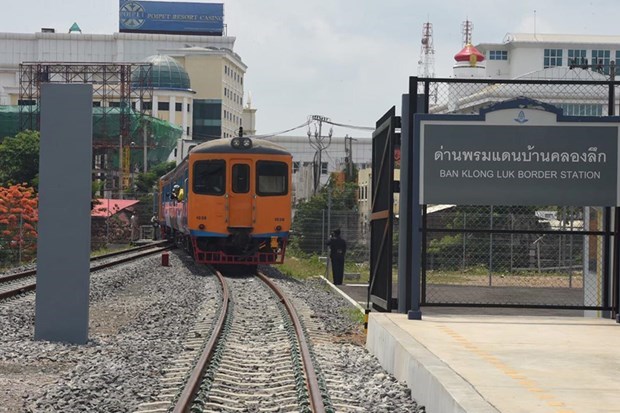Thailand reopens train services to border with Cambodia after 45 years
The State Railway of Thailand (SRT) on 1 July resumed train services to the border with neighbouring Thailand after a 45-year hiatus, according to the SRT.
 |
| At Ban Klong Luk Border Station, Thailand. (Photo: bangkokpost.com) |
There will be two return trips a day from Bangkok to Ban Klong Luk border station in Aranyaprathet district, the eastern Thai province of Sa Kaeo: one will depart in early morning and the other will leave in early afternoon, it said in an announcement. The journey takes about five hours.
The railway, which initially ran deep into Cambodia’s Battambang province via Aranyaprathet station, stopped operation on 1 July, 1974 due to the civil war in Cambodia. It suffered severe damage since then.
The governments of Thailand and Cambodia decided to reinstate the rail links between the two countries in 2014.
In April, Thai Prime Minister Prayuth Chan-o-cha and his Cambodian counterpart Hun Sen shared a ride cross the border from Ban Klong Luk to the Cambodian city of Poipet on a train donated by Thailand. On this occasion, the two leaders co-chaired a ceremony to mark the completion of a cross-border bridge and the reopening of the rail link.
The Thai PM said the restoration of the rail link will boost transportation, border trade, business and investment opportunity, while the Cambodian PM believed it brings new opportunities for rail services that will help contribute to the economic development of the two countries and also to ASEAN integration and the development of Greater Mekong sub-region.
Earlier, the Cambodian side resumed train services from the capital of Phnom Penh to Poipet, about 6km from the Ban Klong Luk station. The cross-border services will start once the two sides reach an agreement on rail transport regulations.
Most of exports from Thailand to Phnom Pend and other parts of Cambodia go through the Aranyaprathet crossing. Latest statistics showed that the two-way trade via the crossing surged from 23 billion THB (750 million USD) in 2008 to 60 billion THB (1.96 billion USD) last year.
(Source: VNA)